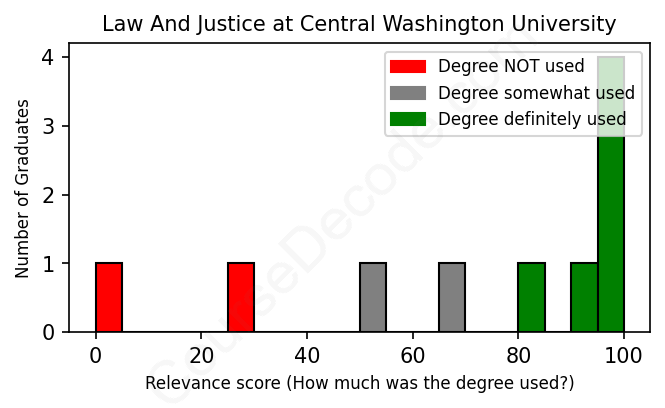
First, some facts. Of the Law And Justice graduates from Central Washington University we've analyzed , here's how many have used (or NOT used) their degree in their career:

These are estimates based on AI analysis of 10 LinkedIn profiles (see below).
The verdict? Slightly above average. Overall, with an average relevance score of 72%, Law And Justice graduates from Central Washington University have a slightly higher likelihood (+5%) of finding work in this field compared to the average graduate across all fields:
And for comparison, here's the chart for all profiles we've looked at across all degrees.
Also, after graduating, only 10% of these graduates have pursued further education other than another Bachelor's degree (such as a Masters degree or other), compared to the average across all profiles of 35%. This suggests a Bachelors degree is enough for most Law And Justice graduates, and it's normal to look for work straight after graduation.
See the details:
|
Relevance score: 66% We think this person has gone into a career only somewhat relevant to their degree. We think this person has gone into a career only somewhat relevant to their degree.
DEGREE INFOGraduated in 2011 from Central Washington University with a Bachelor's degree in Law And Justice. No other secondary education since. JOB HISTORY SINCE GRADUATIONCorporate Senior Security Specialist HomeStreet Bank Apr 2016 - Oct 2021 Physical & Personnel Security Manager NAM  Philips Nov 2021 - Present ABOUT-Assists in developing, implementing, and maintaining a budget, security plans, processes, and strategic multi-year programs to ensure ongoing maintenance, functionality, and current trends of security. Physical protection responsibilities include asset protection, workplace violence prevention, access control systems, video surveillance, internal operations, etc.-Assists in preparing, communicating, and educating company-wide on expertise in the security field including Physical Security, Safety and Security, and Risk Control and Compliance. Plan and management of business unit and departmental processes and practices. Driving, delivering, and supporting programs and projects that adhere to the success of the company.-Assists in oversight of home office reception visitor access, access badge and key management system, building parking validation system, and overall front desk operations. -Assists in oversight of Retail Branches and Remote ATM's across 4 states. Providing support for any issues and access requests, ensuring all alarm and camera equipment are functioning properly.-Assists in coordinating of invoices, work orders for service or repairs of security equipment. Performing audits on alarm system access at Retail Branches and Remote ATM's, overseeing the monthly testing audits, and updating emergency contact information. -Passionate and self-motivator to succeed and deliver successful results. Creative problem solver that focuses on customer initiatives in a fast paced environment with many challenges.-Evaluated, observed, and reported incidents. Prepared accurate, comprehensive incident reports and provided documentation of problems and safety concerns.-Maintained a daily log of activities. Daily operations included: performance evaluations/coaching, scheduling issues, personnel matters, initial and on-going training and follow-ups-Liaison/representative between management and clients |
The top 10 most common jobs done by the graduates we've analyzed (ranked most common to least) are:
When looking at the jobs of graduates from Central Washington University who studied Law and Justice, it seems like a lot of them have stepped into roles that are pretty closely related to their degree. Many started off with internships at various legal organizations, like the ACLU and different law firms, giving them good on-the-ground experience. As they progressed, quite a few moved into roles like paralegals, contract attorneys, and even positions at government agencies that deal with law enforcement or social services. For instance, being a Community Corrections Officer or a Victim Advocate shows how these graduates directly apply their knowledge of law and justice in their work, which is pretty cool.
However, there are also quite a few positions that seem to stray away from the legal path. Some took jobs as teachers, managers in non-legal fields, or even cashiers—jobs that don't use the specialized skills they learned in their degree. So, while many graduates end up in roles that utilize their law and justice background, others find themselves in positions where that education isn't really needed. Overall, it looks like a mixed bag, with a clear trend toward relevant legal roles, but not every graduate walks that path.
Here is a visual representation of the most common words in job titles for Law And Justice graduates (this is across all Law And Justice graduates we've analyzed, not just those who went to Central Washington University):

It looks like graduates from the Law and Justice program at Central Washington University have taken a variety of career paths. Many of them seem to kick off their professional journeys with roles that are pretty relevant to law or public service, like legal internships, legislative fellowships, and positions in the justice system. For instance, one graduate from 2010 started as a legal intern and worked their way up to being an associate attorney before shifting to a teaching role. This shows that while they began on a traditional legal track, they found opportunities to pivot into education.
After about 5 to 10 years in the workforce, it seems like the career trajectories diverge significantly. Some folks have moved into roles that stay aligned with law and justice—like victim advocacy or community corrections—while others have veered off into completely different industries such as education or security management. For instance, a graduate from 2017 went through various positions within the Washington State Department of Health Services, showing a clear commitment to public service, whereas another graduate from 2015 hopped around various management and accounting roles in veterinary and corporate environments. Overall, graduates have the potential to build strong careers relevant to law and justice early on, but as time goes on, some end up taking unexpected paths that may not utilize their degree directly. It's a mixed bag for sure!
Getting a Bachelor’s degree in Law and Justice at Central Washington University—or really anywhere—isn’t a walk in the park, but it’s not the hardest major out there either. You’ll definitely have to dive into some complex topics and do a fair amount of reading, analyzing cases, and writing papers. It requires critical thinking and a solid understanding of the legal system, but if you’re passionate about the subject, you might find it more interesting than difficult. Plus, the support from professors and fellow students can help a lot. Just be ready to stay organized and manage your time well, and you’ll do just fine!
Most commonly, in the LinkedIn profiles we've looked at, it takes people 4 years to finish a Bachelor degree in Law And Justice.
So, when you look at these Law and Justice grads from Central Washington University, it’s a bit of a mixed bag in terms of money. The earlier graduates who interned at places like the ACLU and took on temporary gigs didn’t start out making a ton – that's pretty common in the legal field, especially for those just starting. A lot of them did climb the ladder eventually, with some reaching attorney or managerial positions that likely pay better, especially those in the security and government roles, which can be pretty decent. On the flip side, one more recent grad already started as a victim advocate, which might not pay as well initially. Overall, some of these folks are probably making decent money now, but it took time and a series of roles to get there. It’s definitely a grind at first!
Here is a visual representation of the most common words seen in the "about" section of LinkedIn profiles who have a Bachelor degree in Law And Justice (this is across all Law And Justice graduates we've analyzed, not just those who went to Central Washington University). This may or may not be useful:

Here are all colleges offering a Bachelor degree in Law And Justice (ordered by the average relevance score of their Law And Justice graduates, best to worst) where we have analyzed at least 10 of their graduates:
| College | Score | Count |
|---|---|---|
 Central Washington University Central Washington University
|
72 | 10 |
 Rowan University Rowan University
|
50 | 10 |